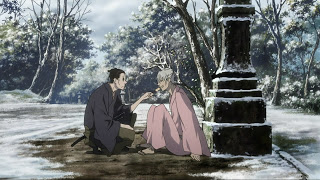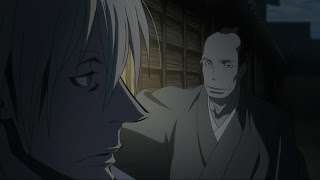I don’t throw the word “great” around a lot when reviewing anime, but I’m completely comfortable doing so with Sarai-ya-Goyou. It was the best premiere series of a very solid spring season and may well go down as the best new series of 2010.
The finale was suitably low-key, for a series whose bailiwick was patient, subtle storytelling and intense character interaction. The episode was squarely centered on Yaichi and his past as Seinoshin, which finally and completely caught up with him – both in terms of old protector Yagi and merciful kidnapper Jin. Yagi finally caught up with Yaichi and invited him for sake, and though “already wasted” the younger man sat down with the older. In a wonderfully quiet scene, Yagi spun a tale of his past with Seinoshin, the big reveal being his suspicion that the servant Yaichi’s death was no accident.
Stumbling through a light snow (and even more exquisite backdrops) Yaichi is accosted by Jin, intent on revenge against “Sei” for selling out the Bakuro gang to the police and (probably) killing Monji. Announcing his intent to kill Yaichi, Jin reveals that it was not in fact the servant Yaichi who had delivered the order to kill Seinoshin from the Saegusa family. Either in anger over this deception or preemptive self-defense, Yaichi mortally wounds Jin with his dagger, and as the other falls into the river he points out that the lie saved Seinoshin’s life.
Yaichi finds his way to his namesake’s grave and shows his first overt emotion of the series, falling to his knees and weeping. That’s how Masa finds him, and after briefly crying on Masa’s knee Yaichi stumbles off. As the days pass the others gather at Katsura-ya, worried about Yaichi, until Matsu reveals that he saw Yaichi at the shrine, where he asked for his help doing another job after the New Year. Masa rushes off to find him just before Yagi shows up at Katsura-ya and asks for a drink. Masa finds Yaichi at the same spot where Yaichi had found him starving at the start of the series, and offers him Mitarashi Dango and a smile. The loop is closed, the Five Leaves will go on, old friendships may be renewed and new ones appear to have held.
I had only one issue with the finale, which was the somewhat cavalier way Jin was dispatched as a device to advance the plot. Like all in this show he was a complex character, and to me somewhat sympathetic – he deserved better. But it’s a minor quibble – generally speaking it was a great ending to a splendid show. I can recall very few one-cour series that offered so much in terms of patient, subtle narrative and dazzlingly complex characters. Much of the credit must go to Ono Natsume’s manga for that, of course, but I officially consider Tomomi Mochizuki an auteur at this point – any series he’s connected with will garner a watch from me.
I know some dislike Natsume’s character designs, but though they’re highly stylized they grew on me. The backgrounds and animation were splendid top to bottom, doing a wonderful job bringing Edo-era Japan to life. And the BGM is some of the best of any series I’ve watched in years – and intriguing mix of traditional Japanese music that sounds perfectly contextualized, with more European and modern-sounding elements blended in.
In the end, as with most of my favorites, it was the characters that elevated this to greatness. All of them were layered and unpredictable. Masa grew tremendously over the course of the series, and while I would neither call him assertive or chipper, by the end he was positively genki compared to the wan, meek man who we saw at the beginning. All of the Five Leaves were given their moments to shine, a backstory to bring them to life, and we were treated to exceptional supporting characters such as Elder and Yagi. Yagi, especially, was a masterful creation – formidable yet whimsical, kind and world-weary. He was the thread that tied Masa to Yaichi in a way, though more than anything what tied all of these characters together was their past. It’s really brilliant stuff all-around, and I’m going to miss spending time with these people every week.





